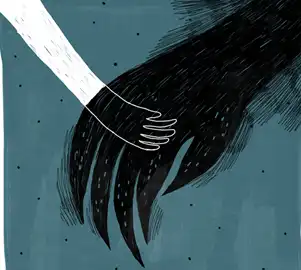祛“邪”精神病人 Some of my thoughts about mentally ill patients
Reflections on the Mental Disorders Intensive Care Unit
第一次走进精神障碍重症监护室,本以为会看到想象中歇斯底里的病人,会听到不知所云的呓语,但是并没有。出乎我意料的,除了病房的整洁干净,还有表现力和理解力与普通人并没有很大区别的病人。和他们交流时,大部分病人也能够流畅地表达他们当下的状态和担忧,甚至有一些的表达能力非常优秀。可是他们的病历或者自我陈述中的内容却是耸人听闻的,当他们平静地向医生说自己对死亡的渴望,或者幻听幻视的症状的时候,我觉得荒诞又魔幻。就像你目之所及,习以为常的世界脱轨了。
我当时并不能理解是药物的效用让他们表现得和寻常人无异,所以我感受不到我和他们的不同。而再听到他们以闲聊的方式诉说绝望抑郁的情绪时,有一种像昆德拉的书名“不可承受的生命之轻”一样的“轻”的感受。我不知道该如何应对这种对生命的“轻”,神奇的是,我发现我在里面待得越久,我越麻木无感。
然而这种无感也是有副作用的,它延续到我结束实习后的好几天。那几天里,我对任何事都丧失了感知的能力,也提不起兴趣,甚至当我回想我的实习经历,这种防御的麻木简化了我对具体事件的记忆。我能记得起的,只有医生日常的问诊和开药,以及病人在走廊上的游荡。
那这种“轻”是我完全没有理解他们,浮在虚空,不愿面对吗?好像也没有。我了解了几个病人的情况。我越了解越发现了我和他们的相似性。
我曾和一个青春期的女病人聊天。和她对话很困难,因为她总是在追问意义。她总会问对方上一句为什么要这样说?这样说有什么意义呢?有一次我跟着医生查房:
“你今天感觉怎么样啊?”,
“你每次问这个问题有什么意思呢?”
…
“看一下你病情有没有变化“
“我不想回答你这个问题,因为它没有意义”
“那你就把它当成日常打招呼吧”
“可是你到底想说什么呢,我不懂你问我这个问题有什么意义。而且你为什么要和我打招呼”
“打招呼的话很多,比如我们说吃了吗,没有实际意义,但就是人们表达问候,关心”
“那人为什么要表达关心呢?”
…
在一系列并没有逻辑递进的追问下,对话似乎直指一个“世界的本源是什么”的哲学问题。后来得知这种追问其实是一种防御心态。因为曾经失去至亲,所以为了不再为失去亲密关系所伤,她采取这种方法和人保持距离感。
医生并不知道如何回答这个问题,但是我们在生活中也遇到过遇到一些在几十米之外遇见熟人,在犹豫如何打招呼时,那几十米显得格外漫长和令人尴尬的时刻。有时她的问题也能引人深思,我们不能否定精神病人的思考力。

credit: Kay Jen Ong
还有是一次医院里因误会发生的打架事件,最后竟然干戈相向的双方能够以“不打不相识”的心态面对彼此。在封闭病房里,因为没有手机,没有家人,三十多个病人也有三十多个人的“江湖”,也就有小团体。不知起因是什么,似乎是一个二十岁的女病人被误会成欺负了一个十三岁的女病人,因此十三岁病人所在的”F4”中的其他病人不分青红皂白地打了无辜的病人,甚至还互相抓头发。被护工拉开后,这些“F4”里的小朋友有情绪了,又开始重操旧业—吞沐浴露。
医护人员简单询问两边情况后,才然后弄清原来是误会一场,于是鼓励打人那方赔礼道歉。大姐姐很轻易地原谅了他们主动诚恳的道歉后,医生还有所保留,“这么快就和好啦?”
“那我就再打一下还回去吧。”
姐姐轻轻在其中一个男生手臂上一拍,男生不好意思的笑着把头低下去。
这样的结局和解决矛盾方式比许多院外的“正常人”还要好。同时在封闭的病房里,缺少客观外在条件的影响人与人的情感比外界更简单。不同年龄层次的人可以坐在一起吃零食,可以进行团体治疗,相互帮助。这些是很积极,甚至好过所谓“正常人”的人际关系和相处模式,不是我们想象中病人该有的样子。

credit: Kay Jen Ong
在逐渐了解病人和他们的成长背景后,我突然觉得他们现在的症状是符合逻辑的。他们的症状只是他们的种种经历结出来的果,与他们本身和主观意愿关系不大。而我作为“正常人”,或是说我比他们略显正常,只是因为我没有他们拥有的那些少见的经历。然而根本没有一个标准去衡量成长背景和原生家庭好与坏,更不用说去判定在此基础上的“上层建筑”即精神病人的思维模式了。这是一种“多元主义”的价值观,但并不意味着我们应当尊重所有人的行为,因为总有一个不能伤害他人的底线,如果突破这种底线就会有相应的约束,这是一种社会契约的表现。
想到这里,我觉得我应该不是一种防御,而是真实的觉得他们确实不是需要别人同情的沉重。
我能够清楚地感觉到,当我和他们相处时,我在努力寻找自己和他们的不同,而正是因为找不到,我才感到焦虑,恐惧,甚至麻木。意识到这一点,我就发现了导致我焦虑的一个原因——我内心被设定了一套严格的,但并没有被我内化的标准来评判自己。而我的焦虑对象必定是全方面的,因此才会在这种和病人的“无差异”中不知所措。然而这套标准也不是适合我的,或者说我没有成功内化这个标准,否则也不会去寻找病人和我的差异。
可是一方面,我能够打破这个标准去“看见”那封闭病房的住户,不在这个标准里去判断他们,能够理解他们的特殊性,另一方面,为什么不能理解我自己,也“看见”我自己,而不是在无限比较中陷入焦虑的漩涡呢?
然而当我意识到我在被一种大众公认但我盲从的标准所驱使时,我也发现我已经有些看不见我自己了。我能够意识到,人们对精神病人的歧视和我对自己无时无刻的焦虑都是由于大家都被社会的默认标准影响了,例如所谓“内卷”,它必定是有一个公认的标准的,而因为社会传媒宣传太多那些在这个标准中的成功人士,人们都会忍不住将这套规则往自己和他人身上套。
和精神病人相处了一个月后,我从内卷焦虑中醒来,即使在某个标准里落后了也没关系,只要时时刻刻都将精力有所托付。在统一的时间标准下,我们都各有得失。可能这样想可以帮助我们逐渐培养主体意识,看见自己,多做一些自己喜欢的事,多按照自己的想法做事。这个过程像是小孩子在经历换牙的过程,经过漫长培养,自己的恒牙总会推翻原有的乳牙。
The first time I walked into the Mental Disorders Intensive Care Unit, I expected to see hysterical patients and to hear their unintelligible ravings. But I did not. Instead, I was surprised about the cleanliness of the ward. The patients there were not very different from ordinary people in their expression and understanding. Most patients were fluent in expressing their current state of mind and concerns and some were even very articulate. But the content of their medical records or self-reports was sensational. I found it simultaneously absurd and surreal as they elaborated to the doctor about their desires of death or their hallucinations. It was as if that world you were accustomed to was flipped on its head.
At the time, the differences between me and the patients seemed minute. I didn't yet understand that it was medication enabling their normal affect. When I heard them talk about their despair and depression in a casual way, there was a feeling of "lightness" akin to the one described in Milan Kundera's book The Unbearable Lightness of Life. I didn't know how to cope with this lightness of life. Miraculously, I found that the longer I stayed in the ICU, the more numb and insensitive I became to it.
However, this insensitivity also had a side effect that continued for several days after I finished my assistant internship. During those days, I lost the ability to perceive or be interested in anything, and even when I looked back on my internship, this defensive numbness simplified my memory of specific events. All I could remember is the doctor's daily consultations and prescriptions and patients wandering about in the corridors.
Was this “lightness” a result of my complete lack of understanding of these patients or not willing to face them? I don't think so. I got to know a few patients. The more I learned, the more I realized the similarities between me and them. I once talked to an adolescent female patient. It was difficult to have a conversation with her because she would often question why things need to be as they are and why things are said in certain ways. Once I followed a doctor checking in with a patient:
“How are you doing today?” ,
“What's the point of asking me that question every time?”
...
“To check if there's been any change in your condition.”
“I don't want to answer that question because it's meaningless.”
“Then think of it as a daily greeting.”
“But what on Earth are you even wanting to say? I don't understand the meaning of asking me such a question and also why you greeted me.”
“There are many such greetings. For example, we ask 'have you eaten yet?' There's no real meaning to it, but it's just a sign of mutual respect and care.”
“So then what's the need to show such care?”
...
In this chain of questioning with no logical progression, the dialogue seems to be directed at the philosophical question of "what is the origin of the world". It was later revealed that endless questioning is the mind in defense; a way of distancing oneself from others deflect the blow of broken intimate relationships.
The doctor didn't know how to answer the questions. Naturally though, we all have encountered moments in our lives when we meet someone we know several meters away and hesitate to greet them—those several meters can seem extraordinarily long and awkward. Sometimes her questions can be thought-provoking. We cannot deny the thinking power of the mentally ill.
After gradually getting to know the patients and their upbringing, it suddenly struck me that their current symptoms were logical. Their symptoms are just the result of their past traumatic experiences and have little to do with them or their subjective will. The reason why I am “normal”, or slightly more normal than they are, is only because I do not have the rare experiences they have. Yet there is no standard by which to measure whether their upbringing and primary family are good or not, let alone the mindset of these mentally ill. This is a “pluralist” value, but it does not mean that we should respect the behavior of all people, because there should always exist a bottom line that cannot be touched. If such a line is breached, then there should be corresponding constraints, as an maintenance of social order and public benefits.
When I think about this, I feel that my feeling towards these patients is not that of defensiveness, and I really think they do not need sympathy from other people about their conditions.
It was clear to me that was struggling to find the difference between myself and these mentally ill patients. And since I couldn't find it, I felt anxious, scared, and even numb. Realizing this, I discovered one of the causes of my anxiety—I had set a strict, but not internalize, set of standards within me to judge myself by.And I can’t find the specific area that I’m anxious about, which is why I was overwhelmed by this "lack of difference" with my patients. However, this set of criteria was not suitable for me either, or I failed to internalize it, otherwise I would not be looking for differences between the patients and me.
On the one hand, I was able to break this standard to “see” the residents of the closed ward, to understand their specificity, instead of judging them within the societal standards. On the other hand, why couldn't I understand myself and “see” myself, instead of being caught in a spiral of anxiety in the endless comparison?
However, as I realized I was blindly following a commonly accepted standard, I also realized that I had lost some of my self-perspectives. Both the discrimination against the mentally ill and my constant anxiety were influenced by society’s default standards, such as the so-called “involution”, which must have an accepted standard. Further promoted by the successful people on various social media platforms, people cannot help but apply this rule to themselves and others.
After spending a month with the mentally ill, I woke up from the anxiety of involution. It is okay to fall behind in a certain standard, as long as we are entrusted with our energy at all times. Under a uniform standard of time, we all have something to gain or lose. Maybe thinking in this way can help us to develop a sense of subjectivity. To see ourselves, to do more of what we like and to do more of what we want to do. This process is similar to that of a child going through the process of changing his/her teeth, and after a long period of cultivation, the permanent teeth will overturn previous baby teeth.
Photo Credit: Pinterest